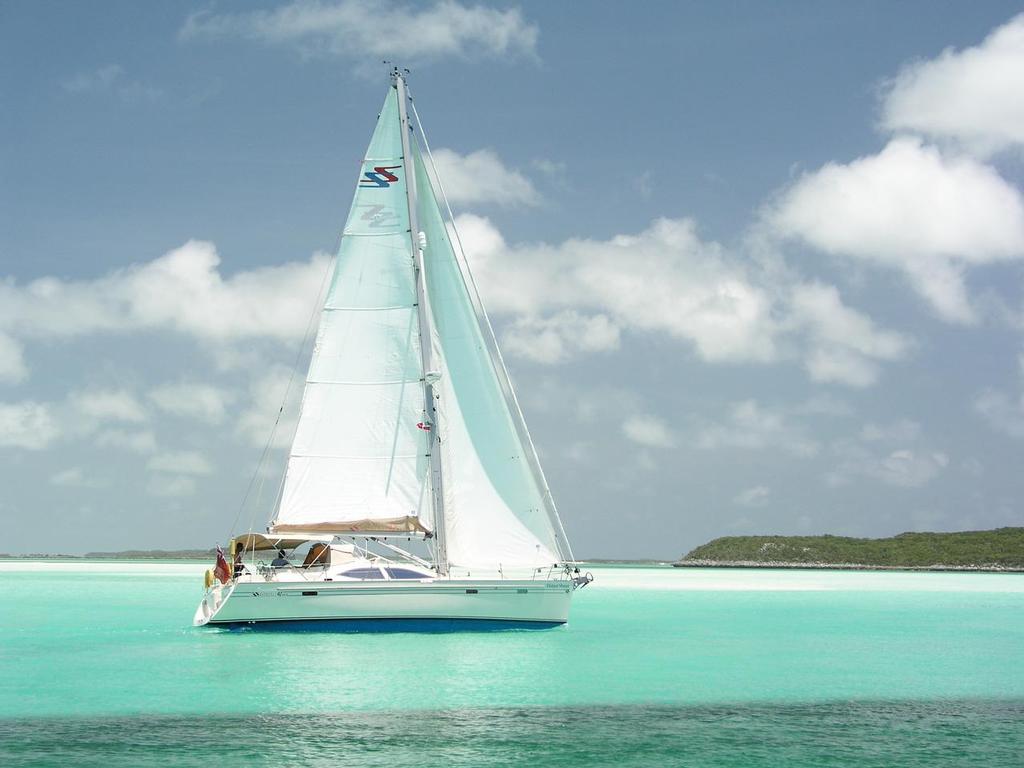24 Years of Cruising - Lessons Learned
by Sheryl Shard on 17 Dec 2013

Sheryl and Paul Shard sailing their Southerly 42 sailboat, Distant Shores, in the Bahamas. - 24 Years of Cruising - Lessons Learned Sheryl Shard


This fall Paul and Sheryl Shard, bestselling authors and award-winning filmmakers, are celebrating 24 years of international cruising - 24 years of magical places they've sailed to and amazing people they've met. Since this is a time that so many people are heading south on their first cruise we invited them to share some thoughts on lessons learned exploring the world by sailboat.
Lesson 1:
Before setting off on our first international voyage, Paul and I had been sailing our self-built Classic 37 sloop, Two-Step, (our wedding present to each other) on the Great Lakes of Canada. We were in our 20's, had saved our money after paying off our student loans, spent 3 years building and sailing our new boat, and were looking forward to heading south from Toronto for adventures in warmer climes. The plan was to take a 1-2 year sabbatical and then settle down. The 'settling down' part never happened.
Lesson Learned – Going Cruising is Life Changing
Lesson 2:
Our 1-2 year sabbatical to explore the Caribbean stretched into a 3-year Atlantic Circle taking us across the Atlantic to the Med then south to Brazil before returning home briefly via the Caribbean. We found that the money we'd saved went further than we'd thought as our experience grew. We anchored more than staying in marinas, discovered the fun of shopping in foreign markets and cooking on board versus eating out in restaurants and did our own repairs and maintenance which saved a bundle. Since we'd built our own boat we had the tools and know-how. We gave up our early-marriage apartment and sold our furniture, so had no additional expenses such as mortgage payments, house insurance or utilities, etc. while cruising. Our budget for that first cruise was $1,000 US a month and we lived and explored well. Here's a link to an article we wrote and recently updated about the Costs of Cruising---http://searoom.com/coststoday2006/
Lesson Learned – Cruising Life Can be a Very Affordable Lifestyle
Lesson 3:
Our background and work training is in photo-journalism and television production so it's natural for us to share our cruising experiences this way. Our one-hour travel documentary about our first 3-year cruise, Call of the Ocean, was picked up Discovery Channel in 1992. This led to our first sailing TV series, Exploring Under Sail, which we co-produced with Canadian director, Peter Rowe (Angry Planet, Adventures in Filmmaking) and required that we do another couple of years of cruising. Twist our arms! When that contract ended we were ready to go out on our own with the Distant Shores sailing adventure TV series which is now in its ninth season with 117 half-hour episodes and is broadcast worldwide in 24 languages. You can download all the episodes and also get them on DVD through the Distant Shores website. http://www.distantshores.ca We also published a book, 'Sail Away! A Guide to Outfitting and Provisioning for Cruising', which became a best-seller with 11,000 copies sold. We're currently updating the book to a third edition.
Lesson Learned – There are Many Ways to Earn a Living While Cruising
Lesson 4:
During the 24 years that we've been cruising we've put over 90,000 nm under the keels of the 3 boats we've owned. We've crossed the Atlantic Ocean 5 times, most recently last December as participants of the Atlantic Rally for Cruisers (ARC), which we filmed in a 3-part series released in August. Our first transatlantic crossing was from Bermuda to the Azores in 1990. We were excited and nervous as we waited in St. George's Harbour in anticipation for front after front to pass by Bermuda so we'd have a good weather window to make the jump. Two weeks went by. Boats were gathering. We were afraid if we had to wait any longer we'd lose our nerve. There was a small break in the weather and a few us convinced each other we should go for it. Within 24 hours the coming front sped up and caught us at sea. The winds howled and there was no way of turning back. The seas built to the size of 2-storey houses and we fought the conditions for 3 exhausting days and nights. Finally we hove-to to get some rest and the storm passed on. We faced the nightmare and got through it arriving safely in Horta, Fayal, in the Azores 18 days later, somewhat shaken but undaunted.
We've never had such a bad experience again. Why? Now we wait for reliably good weather. We have the time. And how bad can it be to spend one more week in a paradise like Bermuda waiting until conditions are good?! I mean, really. Also, we have more experience now so we strategize better if bad weather does catch us offshore, which is rare with the excellent weather forecasting and accessibility to it at sea these days via SSB radio and grib files by e-mail. Plus we aren't so anxious about heavy weather since we know what to expect, what to do, and know just what we and our boat can handle. We are unmoved by the advice of others if their decisions don't jibe with ours. We've paid the price.
Lessons Learned: Wait for Good Weather. Do What Feels Right for You and Your Crew Despite What Everyone Else is Doing.
Lesson 5:
An adjunct to the lesson above is that having a set schedule or a deadline often tempts you to sail in conditions that you normally wouldn't feel safe or comfortable in. Things such as meeting guests coming to visit you at a certain location or time. It's so important to give yourself lots of lead time and to warn your guests that if you are delayed by weather they will have to make alternate plans until you can get there. Not easy to do but the dangers aren't worth it. This is also something to think about if you're joining a rally with a set start date. We were impressed with the organizers of 2012 Atlantic Rally for Cruiser (ARC) who delayed the start by 2 days due to weather – a huge logistical decision since there were over 200 boats in the fleet, most with crew who had deadlines for flying home at the other end. Even still the day of the delayed start turned out to be miserable but off we all went. If we'd been on our own, most agreed they would never have started a passage on such an unpleasant day.
Lesson Learned: Schedules and Cruising Don't Mix
Lesson 6:
Thinking back to our first real (but short) blue water passage in December 1989 - a one-night crossing of the Gulf Stream from Florida to the Bahamas where we were going to cruise for the winter of 1990. (We loved the Bahamas and have been back to cruise many times over the years!) Knowing it would be hard to get certain foods and supplies in the islands and that things would be much more expensive than in the US, we loaded the boat on that first crossing with so much stuff that she became top heavy. The lockers were bursting with provisions and the decks were covered in fuel and water jugs as well as a couple of extra propane cans. We waddled across the Gulf Stream in gentle conditions but later, in heavy weather down-island, the boat rolled dangerously and we took water over the decks.
A propane tank broke loose and started bashing against the fiberglass hull. Although Paul was safely clipped onto the boat with his safety harness, it was a risky maneuver in the pounding seas to get that propane tank back on board. Now we keep our decks clear and cargo weight as low and centrally distributed as possible. We still carry a lot of stuff since we like the independence and self-sufficiency, but now never at the expense of the safe performance of the boat. This goes for gear and equipment too. Better to have a simply equipped boat that's seaworthy than have a boat loaded with all the latest equipment, toys and appliances that makes the boat dangerous to control.
Lesson Learned: Clear the Decks
Lesson 7:
Paul had a lot more sailing experience than I did when we set sail in 1989 so we made a deal that if I wasn't comfortable with the conditions on a planned day of sailing that we would wait, change the plan, or turn back if we were already at sea. Paul knew that even if my fears were unfounded, if I got traumatized that would seriously affect the future of our cruising plans. We both were committed to making our sailing sabbatical a happy experience for both of us. Because we respected this agreement I felt safe to stretch myself if I was a little nervous about the conditions since I knew if it got to be too much Paul would turn the boat around or head for shore sooner than planned. This really helped me to build my experience and confidence and I am forever grateful to him. Twenty-four years later we're both still loving the cruising life!
Lesson Learned: Respect the Fears of Your Mate and Crew
Lesson 8:
Something that I don't see written about very often with regards to cruising is 'travel weariness'. This often sets in when you've been on the move for awhile and start to get impatient with things and each other. Stuff you got excited about in your early days of cruising you don't notice anymore or start taking for granted. You feel physically uncomfortable. The fun has gone out things. This is the time to stop.
You may need to stop for only a day or two if you've been on the move at a fast pace for a few weeks, a common problem with first time cruisers used to one-week packed-full boating vacations. You can't keep the same pace long-term.
Sometimes you need to stop for a month or so to do maintenance and enjoy the pleasures of getting to know a place really well and make local friends. Sometimes it's good for the crew to get off the boat for a night or two and enjoy the luxuries of comforts in a hotel ashore if you've had some miserable weather.
Sometimes the break needs to be even longer – a year or several years due to family or work issues. But think of it as just a break. Not that 'it's over'. Most people head out again sooner or later.
After our first 3 years of full-time cruising we really started getting travel weary so knew it was time to head home. Within a year we had regained our enthusiasm and were back 'out there'. Our work now requires that we're home working in the studio for several months each year and this half-on half-off the boat experience is the perfect balance for us. We never get tired of things and are enthusiastic wherever we are – home or ashore. Many cruisers we meet have adopted this part-time cruising lifestyle, storing their boats for part of the year to make visits home to work or see the family or to travel in different ways.
You should never feel bad if you start noticing that you've lost some of your enthusiasm for the cruising life. People commit so much to making it happen that they feel as if they are giving up on the dream when they realize they aren't having fun anymore. And they're often afraid to voice these feelings to their partner or crew mates which just makes it worse.
Sometimes it just takes a small change to put the sparkle back into things again.
Lesson Learned: Take a Break Once in Awhile
Lesson 9:But really, it's pretty easy to keep things fun while cruising. You meet such great people wherever you go, both from the cruising community as well as local people. The friends you make become good friends since you have so much in common and are sharing exciting experiences together. And you will be blown away by the kindness you are shown by strangers. Throughout the world we have met so many amazing local people who have helped us out, invited us to their homes, given us a lift, even loaned us their cars! When you watch the news you can feel that the world is an unfriendly dangerous place. Sure there are dangerous places but you can avoid them and if you don't like something or someone you can just raise anchor and leave when you're cruising. I don't deny that there are baddies out there but on the whole we have discovered that the there are a lot of nice people out there and meeting them is one of the greatest joys of cruising.
Lesson Learned: The World is a Friendly Place
So if you're cruising now, just starting out, or still dreaming of cruising, we wish you all the best and look forward to meeting you 'out there'.
About Paul and Sheryl Shard:
Paul and Sheryl Shard are the authors of best-selling book, 'Sail Away! A Guide to Outfitting and Provisioning for Cruising', which they are updating to a third edition. They are also the fun-loving hosts of the award-winning sailing adventure TV series, Distant Shores, which is broadcast in 24 languages around the world on Travel and Escape channel, Cottage Life channel, AWE TV, Documentary Channel and Travel Channel. They have documented their experiences sailing to over 60 countries and colonies on 5 continents and are currently cruising and filming in the Caribbean aboard their Southerly 49 sailboat, Distant Shores II. Meet them at the Strictly Sail Chicago boat show January 24-26 and the Toronto International Boat Show January 11,12,18,19. You can follow their adventures on www.distantshores.ca
If you want to link to this article then please use this URL: www.sail-world.com/117660